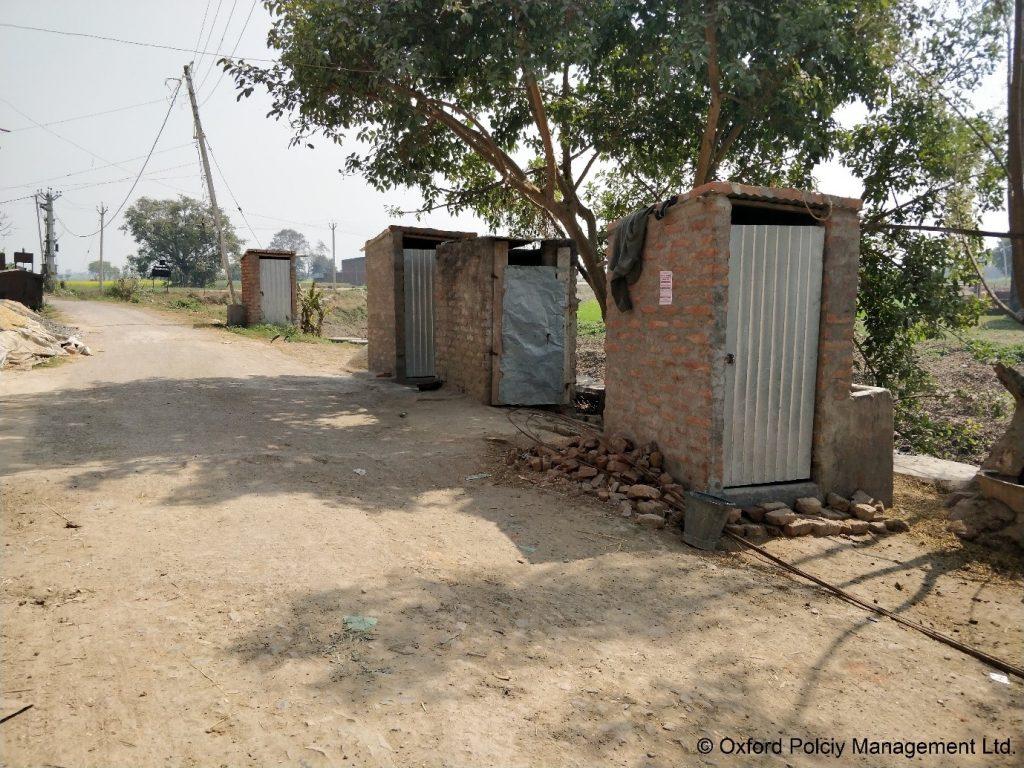It has been one year since the Government of India declared all of rural India – Open Defecation Free (ODF) – a landmark moment for sanitation in India. This achievement is considered a success of the government’s flagship programme – Swachh Bharat Mission (SBM) (which translates to Clean India Mission). With World Toilet Day coming up next month, it is an opportune moment to reflect on next steps for the sanitation sector in India and whether and how improved toilet use can lead to improved public health outcomes.
In this blog we present some findings from a randomised control trial conducted in six districts in rural Bihar, India. This was conducted as part of the International Initiative for Impact Evaluation’s (3ie) ‘Promoting latrine use in rural India Programme’. The study was conducted from 2017-2019 by Oxford Policy management in partnership with World Vision India and Ideas42. The aim of the study was to understand the effect of a set of behavioural interventions on toilet use. The behavioural intervention consisted of community meetings and household visits which aimed to influence behavioural barriers to regular toilet use, amongst households that already had a toilet.
Results demonstrated a steep reported increase in toilet use over the duration of the study, across both intervention and non-intervention areas. Our overall evaluation findings indicate that SBM and related sanitation campaigns could have played a dominant role in influencing toilet use across treatment and control areas uniformly. However, the findings also point to underlying infrastructural, knowledge and socio-behavioural related challenges that pose a major barrier to reaping the public health gains from improved toilet use.
The first challenge relates to toilet infrastructure. SBM recommends a twin-pit toilet design of contextualized standard measurements that ensures safe and sustainable on-site treatment of faecal waste through natural decomposition, suitable for rural contexts globally. However, we found that about 35% of our sample (consisting of only twin-pit toilets) did not adhere to this design; having deeper and larger toilet pits than recommended. Another recent sanitation study in rural north India found that more than 70% of household toilets were either single pits or other types of containment structures (including septic tanks). Overall, these figures suggest that a large majority of toilets in rural India do not conform to the standard twin-pit design (SBM toilets). The ubiquity of such ‘non-SBM’ toilets in rural India is a cause for concern for its potential public heath associated risks. For instance, deep-sized pits may cause groundwater contamination in certain regions. Similarly, deeper/single pits and septic tanks, once filled up completely, need to be safely emptied, treated and disposed, or they could be more harmful than open defecation itself. However, this is a major challenge, given the overall lack of faecal sludge treatment infrastructure in India.
The second challenge is related to lack of awareness about proper faecal waste disposal. We found that households had limited awareness about the duration and process of decomposition of faecal matter in the toilet pits. There were reports of toilet owners emptying pits prematurely (i.e. before the faeces decomposes completely and is safe to handle) and disposing the concentrated non-decomposed waste in open fields, canals etc, which would be detrimental to health of people exposed to it.
The third challenge relates to the continued practice of manual emptying of the toilet pits. One of the benefits of a twin-pit toilet is that once the faecal matter is decomposed, it can be safely removed by the toilet owner. However, the study finds that most people are averse to emptying their pits even when the faecal matter is decomposed and is completely safe to handle. Most households reported that they prefer to outsource pit emptying to people belonging to the Dom caste (a sub-caste in the Hindu caste hierarchy). This practice reinforces caste hierarchies and social norms around purity and pollution, and suggests a further increase in caste-based outsourcing of pit emptying as toilet use increases in India.
While the “clean India campaign” has had success in increasing access to toilets, our study findings signal that there is more to be done if the broader benefits of toilet use are to be obtained. A comprehensive rural sanitation strategy needs to go beyond toilet use to address the nuances of appropriate construction, and safe disposal of faecal matter. The discourse needs to re-emphasize on the importance of the standard twin-pit design for toilets and its suitability for rural. Given the large number of toilets in rural India that do not adhere to the twin-pit design and households indulging in mistimed emptying of pits, it is equally important to engage with the rural community on increasing awareness on proper emptying and disposal of faecal waste, to actualize the public health gains of toilet use. Proper onsite treatment and disposal of faecal waste has become a further necessity given the risks of COVID-19 transmission through infected faecal sludge, as pointed out by some of the preliminary studies by WHO.
Secondly, sanitation policy needs to factor the inherent caste dynamics and realities of rural India. While this has been pointed out in previous studies, our study reiterates that existing policies have been ineffective in changing people’s attitudes towards pit emptying. Changing this attitude would require active community engagement to battle social taboos, and socially inclusive campaigns advocating self-pit emptying, safe de-sludging and disposal practices. At the same time, identifying and safeguarding marginalised communities involved in caste-based pit emptying work and rehabilitating them with alternate employment opportunities needs to be made a political priority.
Our study reiterates that sanitation policies need to expand beyond toilet use to have sustainable health outcomes.
